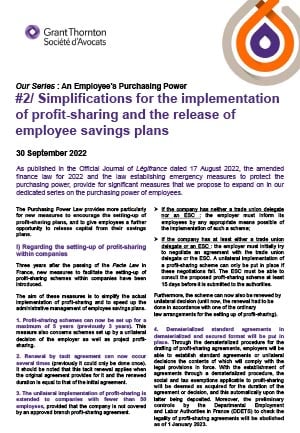As published in the Official Journal of Légifrance dated 17 August 2022, the amended finance law for 2022 and the law establishing emergency measures to protect the purchasing power, provide for significant measures that we propose to expand on in our dedicated series on the purchasing power of employees.
The Purchasing Power Law provides more particularly for new measures to encourage the setting-up of profit-sharing plans, and to give employees a further opportunity to release capital from their savings plans.
I) Regarding the setting-up of profit-sharing within companies
Three years after the passing of the Pacte Law in France, new measures to facilitate the setting-up of profit-sharing schemes within companies have been introduced.
The aim of these measures is to simplify the actual implementation of profit-sharing and to speed up the administrative management of employee savings plans.
- Profit-sharing schemes can now be set up for a maximum of 5 years (previously 3 years). This measure also concerns schemes set up by a unilateral decision of the employer as well as project profit-sharing.
- Renewal by tacit agreement can now occur several times (previously it could only be done once). It should be noted that this tacit renewal applies when the original agreement provides for it and the renewed duration is equal to that of the initial agreement.
- The unilateral implementation of profit-sharing is extended to companies with fewer than 50 employees, provided that the company is not covered by an approved branch profit-sharing agreement.
- If the company has neither a trade union delegate nor an ESC : the employer must inform its employees by any appropriate means possible of the implementation of such a scheme;
- If the company has at least either a trade union delegate or an ESC : the employer must initially try to negotiate an agreement with the trade union delegate or the ESC. A unilateral implementation of a profit-sharing scheme can only be put in place if these negotiations fail. The ESC must be able to consult the proposed profit-sharing scheme at least 15 days before it is submitted to the authorities.
Furthermore, the scheme can now also be renewed by unilateral decision (until now, the renewal had to be done in accordance with one of the ordinary law arrangements for the setting up of profit-sharing).
- Dematerialized standard agreements in dematerialized and secured format will be put in place. Through the dematerialized procedure for the drafting of profit-sharing agreements, employers will be able to establish standard agreements or unilateral decisions the contents of which will comply with the legal provisions in force. With the establishment of agreements through a dematerialized procedure, the social and tax exemptions applicable to profit-sharing will be deemed as acquired for the duration of the agreement or decision, and this automatically upon the latter being deposited. Moreover, the preliminary controls by the Departmental Employment and Labor Authorities in France (DDETS) to check the legality of profit-sharing agreements will be abolished as of 1 January 2023.
There is little doubt that these four key measures will help boost profit-sharing schemes in companies, particularly in VSEs and SMEs, but the crucial issue remains the definition of the criteria and methods used to calculate and distribute the proceeds of profit-sharing. There is arguably a risk that in the setting up of a dematerialized procedure the specificities of the company's activity and any level of detail will be overlooked. The advantages proposed by the value-sharing or purchasing power premium (the PPV) with its essentially short-term aims, could act as a brake in the growth of employee savings schemes in those companies which to date do not have them.
II) Regarding the exceptional releasing of capital from employee savings plans:
Until 31 December 2022, the Purchasing Power Law gave employees the possibility to release capital (securities, shares, equity or other amounts) from their profit-sharing and incentive schemes earlier than the applicable expiration deadline of the 5 or 8-year restricted period provided for.
The early release of savings, to be carried out in a single operation at the request of the employee, is capped at €10,000 net of social security deductions. The amounts released will be exempt from income tax and social security contributions.
The capital released must be used to “finance the purchase of one or more goods or the provision of one or more services”.
The managing body of the savings plan or failing this, the employer, must declare the sum that has been released by the employee, to the French tax authorities.
The beneficiary must provide the tax authorities with supporting documents attesting to the use of the sums released.
The text provides that capital placed in the following be exempt from any early release, namely:
- Shares acquired in funds invested in solidarity-based companies;
- A company or inter-company pension savings plan (Perco, a Pereco, a Pero or a grouped Pereco).
Furthermore, the prior signing of a collective agreement is necessary when:
- The participation agreement or the savings plan rules provide for: the acquisition of company securities or those of a company in the group or the acquisition of equity or shares of undertakings for collective investment in transferable securities as covered by Articles L. 214-165 to L. 214-166 of the Monetary and Financial Code (FCPE or employee shareholding fund);
- The participation agreement set up within production cooperatives provides for the allocation of sums in company shares or in blocked current accounts.
Lastly, within 2 months of the enactment of the law, i.e. before 16 October 2022, the employer has the obligation to inform employees of the possibility to an early release of their savings. Companies wishing to allow their employees to benefit from option should start negotiations as soon as possible.
***
The next issue in our series “An Employee’s Purchasing Power” will take another look at the value-sharing or purchasing power bonus.
Our team at Grant Thornton Société d’Avocats remains at your disposal to assist you in the implementation of these new measures in the framework of your company’s HR policy.




